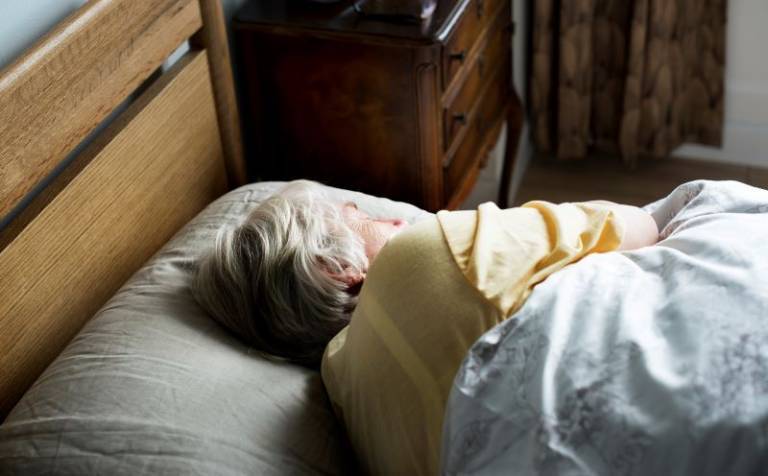Tracking sleep with an innovative sensor may help diagnose dementia
25 May 2023
Researchers from UCL, the UK Dementia Research Institute, Imperial College London and Newcastle University, are involved in a major new collaboration to develop a technology that could help identify people at risk of developing dementia by analysing their sleep patterns.

Using a Sleep Analyzer tracking mat produced by technology company, Withings, the researchers created The Dementia Sleep Index - by comparing sleep patterns of people living with dementia to data that equates to 3.7million nights of sleep in the general population. From this, they were able to create a ‘digital biomarker’ that reveals a signature characteristic of sleep disorders frequently observed in people with dementia.
The new project, which is funded by the National Institute for Health and Care Research (NIHR), will expand on this, to see if it is possible to identify people at risk of developing dementia.
To do this, the team will study 250 people from the Insight 46 study, which is drawn from members of the MRC National Survey of Health and Development (NSHD) 1946 British Birth Cohort, based at UCL.
These individuals were all born in the same week in 1946, and now aged 77, have been studied throughout their lives – with detailed investigations of their brain health.
Professor Jonathan Schott (UCL Queen Square of Neurology and UK DRI Clinical Advisor), said: “Studying the Insight 46 cohort offers us a unique opportunity to really understand the way sleep behaviour relates to dementia risk.
“If successful, this technique has huge potential for identifying people within the wider population who might take part in clinical trials or, in due course, treatments to prevent cognitive decline.”
Disrupted sleep is a common symptom experienced by people living with dementia, however we still do not know if this is a consequence or a driving factor in the disease progression. Growing evidence suggests that long-term sleep disturbances could be a risk factor for dementia, and scientists are working to uncover the mechanisms behind this potential link.
The Sleep Analyzer tracking mats used to monitor sleep are placed underneath a person’s mattress and can detect heartrate, respiration rate, sleep phases and when the person gets in and out of bed. It is also a medical device that can detect sleep apnea and snoring time.
The data is then sent back to the research team in real time through a cellular data network.
Meanwhile, a team from Imperial’s Helix Centre and Newcastle’s Centre of Excellence in Dementia Research will work with members of the public, and health and social care professionals, to design a service that could be used to assist dementia diagnosis using this digital biomarker in the NHS.
The team will co-design the service with representative users, and explore issues around acceptability, accessibility and understanding the consequences of the data.
Professor Louise Robinson from Newcastle University, said: “This innovative project brings together a wide range of expertise to explore whether everyday, home-based technology can help us in the detection and monitoring of dementia and whether such tools are acceptable to the public.”
Links
- Professor Jonathan Schott’s academic profile
- UKDRI
- Insight 46 study
- MRC National Survey of Health and Development
Image
- Rawpixel on iStock
 Close
Close

